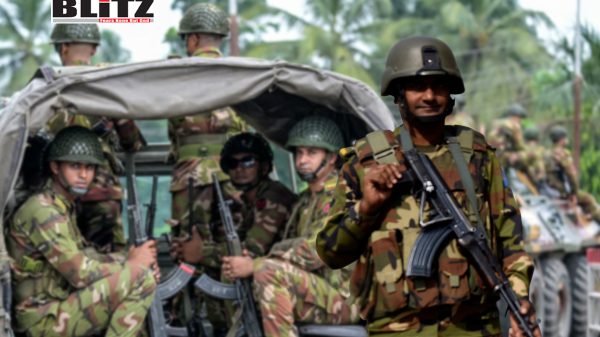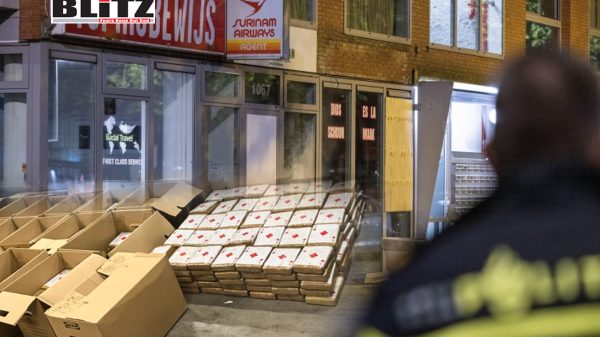Blame-game centering Bangladesh Army: A broader plot of rattling sovereignty and regional security
- Update Time : Monday, October 20, 2025

There are moments in a nation’s life when it must pause, reflect, and ask: who truly stands guard when the storm arrives? In Bangladesh, that answer has never been ambiguous — it is the Armed Forces. Through cyclones and floods, pandemics and insurgencies, and the collapse of governance itself, the nation’s soldiers have been its final line of defense. Yet today, the very institution that embodies sacrifice and national pride stands under siege — not from an enemy across borders, but from within its own discourse, its own politics, and its own misguided narrative of justice.
Nowhere in the civilized world do citizens vilify their own defenders the way Bangladesh’s military has been vilified in recent times. The uniformed men and women of the Armed Forces do not serve for wealth or privilege. They enlist to defend the soil, to offer — if fate demands — the ultimate price: their lives. In no other profession is such sacrifice written into the very job description. Yet, when these defenders are publicly humiliated, dragged into politically charged trials, or painted as villains without verdict, the moral fabric of a nation begins to tear.
The current wave of arrest warrants and criminal proceedings against officers of the Directorate General of Forces Intelligence (DGFI) and members of elite security units like the Rapid Action Battalion (RAB) reflects a troubling trend. Justice must indeed be served — but justice, in any democracy, cannot be weaponized. It cannot be reduced to spectacle or vengeance. For when justice turns political, it ceases to be justice at all.
The DGFI is not a mere bureaucratic office; it is an organ of national defense operating under the Official Secrets Act. Its personnel handle matters of counterterrorism, espionage, and state security — domains governed by confidentiality, not by public trial. Section 123–125 of the Evidence Act and Section 352 of the Code of Criminal Procedure explicitly protect communications made in official confidence, allowing the state to withhold information where disclosure could harm national interests. These legal safeguards are not barriers to accountability; they are the very balance that keeps justice from collapsing into chaos.
To summon intelligence officers before a tribunal and compel them to reveal classified operations is not transparency — it is legal recklessness. It risks exposing not just state secrets, but also the lives of agents, informants, and allies who operate in the shadows to protect the Republic. Every sovereign nation — from the United States to India — understands this. Their courts handle national security cases through in camera proceedings or redacted evidence, ensuring that justice coexists with security. Bangladesh should be no exception.
Yet what we see today is a creeping erosion of restraint. The so-called “disappearance commission,” originally formed to investigate alleged human rights violations, has been subtly repurposed into a tribunal against the military. A sophisticated narrative has been constructed — that these trials are about accountability for past abuses. But in practice, they risk transforming into an assault on the morale and cohesion of the Armed Forces. Before any verdict, before any cross-examination, a media trial has already been held. Officers are branded criminals. Units are condemned as rogue agencies.
This atmosphere of hostility is not organic. It is the continuation of a political design that began years ago — a gradual campaign to weaken every pillar of national defense. The attempt to delegitimize the RAB, the vilification of the police, the quiet dismantling of intelligence agencies, and now the public defamation of the military — all form part of a calculated strategy. Those who once sought to politicize the military now seek to paralyze it through humiliation.
The consequences are profound. When parents begin to fear that sending their sons and daughters to serve the flag may one day bring shame instead of honor, a nation’s sovereignty starts to decay from within. This psychological warfare — subtle but lethal — aims not at the body of the army but at its soul. And it is the duty of every patriot to resist it.
Even amidst these provocations, the Armed Forces have displayed remarkable discipline. The Army Headquarters has made it clear: there will be “no compromise with justice.” The institution has cooperated with investigative bodies, provided access to records, and facilitated interviews when requested. Yet, it has refused to allow justice to be replaced by mob opinion. That is the hallmark of a disciplined, law-abiding institution — not an institution with something to hide, but one that values process over performance.
History too provides context. From the 2009 BDR massacre to the 2014 Narayanganj seven-murder case, the military has repeatedly been thrust into crises orchestrated by political actors, only to bear the blame. The narrative of villainy has persisted not because of truth, but because of convenience. The military, unlike politicians, cannot defend itself in public speeches or television debates. Its silence, borne of discipline, has too often been mistaken for guilt.
What makes the present moment particularly dangerous is its timing. Bangladesh is approaching another national election — a period historically ripe for manipulation. It is no coincidence that disinformation about the army has multiplied. This is psychological destabilization — a deliberate ploy to demoralized the armed forces.
But this time, the people see through the deceit. The nation remembers that it was the army that restored order during past chaos, that stood with citizens when institutions collapsed. The Election Commission’s recent decision to re-include the Armed Forces under the definition of “law enforcement agencies” in the Representation of the People Order (RPO) is both wise and necessary. It acknowledges what the public already believes: that free and fair elections cannot happen without the disciplined guardianship of the military.
Bangladesh is not alone in facing such tests. Nations like Sri Lanka, Nepal, and Tunisia have all undergone political upheavals, yet none have resorted to publicly dismantling their armies in the name of justice. The difference lies in wisdom — the ability to separate reform from revenge.
To weaken the armed forces in the name of accountability is to commit a grave national error. To destroy morale in the name of transparency is to hand victory to those who thrive in instability. A true democracy reforms its institutions — it does not ridicule them.
Bangladesh now stands at a moral and constitutional crossroads. It must decide whether to honor its defenders or to persecute them for serving the Republic. However, it was the ruling government that misused these national institutions. If the nation is to see justice and ensure accountability, it must be brought upon the ruling members, not the state machinery itself.
The uniform is not merely cloth and insignia. It is the silent covenant between the people and those who stand ready to die for them. That covenant must never be broken — not by politics, not by propaganda, not by those who mistake noise for courage. For the sovereignty of Bangladesh and for the sake of its future military leaders, it is the solemn responsibility of every service member to put a stop to all subversive activities. Because when the last line of defense is dishonored, the Republic itself begins to fall.










